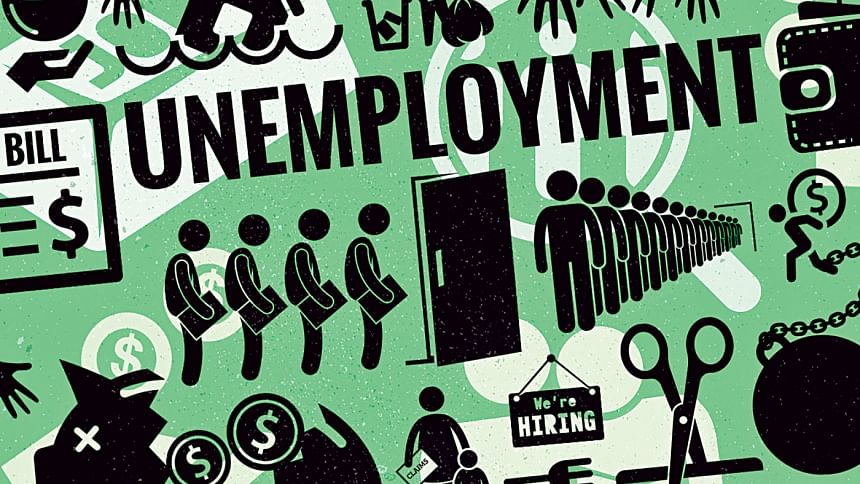Institutional reforms are essential to create jobs

In the post-independence period, Bangladesh's number one problem was population growth. The government devoted its utmost energy to confront population growth which was almost at three percent—which was unaffordable given the scanty resources of a new-born nation. The public campaign was widespread and the regimes were serious enough to stem the growth of population, which has now cascaded down to the manageable rate of one percent.
While the government can feel a streak of complacency in population control, another monster, named unemployment, has been looming on the horizon since the mid-eighties. And we witness no feasible solution in sight to control this epidemic of joblessness for the youth, in particular. Moreover, the corresponding campaign along with institutional reforms from the government side to fend off this storm of rising unemployment is conspicuously inadequate and often inept. Why? The main reason as to why unemployment hasn't been addressed the way population growth once was is the political mindset of regimes: lest people in the oppositions and critics brand rising unemployment as a failure of rulers.
The approach to address unemployment has remained faulty, superficial, bureaucratic, and substandard. That's why after 50 years of independence and 30 years of liberalisation since the adoption of the market economy, which has enabled us to secure an upward trend in GDP growth, unemployment rates have kept on rising defying economic theories.
Why isn't Bangladesh's rise in unemployment justified by the rising growth numbers? In 1962, Arthur Okun—the then economic adviser to President Kennedy—asserted that unemployment rates move downward if growth rates move up. This later became the famous Okun's Law. Rarely do we call anything law unless it's more powerful than theories. Okun's Law was verified by data and estimation in various countries. And it makes sense very simply. Growth is supposed to raise income and create more job opportunities, depressing the ugly heads of unemployment.
But that's not true about Bangladesh. Figures show an irresistibly upward trend in unemployment despite rising growth. Why? Growth numbers are quantitatively encouraging but qualitatively weak—they aren't as inclusive as claimed. Second, education is subpar—generating more certificates than job opportunities and entrepreneurships. That's why young people still dream to become bureaucrats and devote their utmost efforts to secure jobs in public services which can at best contribute to less than 5 percent of total jobs in the economy.
A note of caution about data is needed. Actual unemployment rates are much higher that what we get from data, because the ILO method for reporting unemployment is bound to underestimate the actual state of unemployment. The BBS official or the government rate which hovers over around 6 percent is a misstatement of the actual situation. It sounds like Bangladesh has reached the level of Switzerland or America in handling unemployment. Almost three million educated youths enter the job market every year and hardly one-fourth of them find wage-paying jobs. A recent study by BIDS finds that three-fourth of high educated youths remain unemployed—a highly alarming figure which can't be compared with any other country among Bangladesh's peers.

The way the US Bureau of Labor Statistics (BLS) calculates would be better for Bangladesh to calculate unemployment, but the mechanism is still absent here. Whatever estimates we accept, the upward trend in unemployment is evident and that's creating the confusion by defying as well as dampening the enthusiastic growth story of the country to a great extent. Growth must be more inclusive and employment generating. Otherwise, it will undo all gains.
It's invariably the private sector which is supposed to generate more than 80 percent of total jobs in a market economy. And those jobs must be recorded in the formal sector. However, the share of the formal sector in total jobs is as low as 15 percent, suggesting other 85 percent people are working in the informal sector with meagre wages and without any kind job security. This is a big institutional blackhole for the country.
There is no visible attempt to bring more jobs under the umbrella of the formal sector just because the lobby of the employers is much stronger than that of jobseekers. Laws are employer-favouring and rules are ruled by the superrich. It's much more profitable for those employers to hire young people without job contracts and thus pay as low as possible, and more importantly, boot the employees out any time they wish. This resembles the classical paradigm of slavery—a way to extort maximum profit.
The disease of profit maximisation is so widespread that it has turned into a norm in the corporate sector to brag over profit numbers without corresponding figures on employment generation. In the media, we are pleased to see the banks topping the list of profit makers without inquiring how many workers are actually employed in those organisations or how many jobs they created over the last year. The government must make it mandatory for all banks and other financial institutions not only to report their annual profit, but also the figures of profit per employee.
The time has come for the government to prevent the profit vultures from growing and reward job generators the most. If Bank A, for instance, stands below Bank B in terms of profit but notches higher in recruitment, Bank A could be serving the economy better. Actually, it's the central bank's job to implement the rules of employment generation for all banks and financial institutions, particularly in a developing country where unemployment is acute.
There are two main objectives for each central bank—called the dual mandate. Central banks have to maintain two things together: maximise employment and ascertain price stability along with a tolerable level of inflation. In the US, the Federal Reserve always looks at the unemployment rate and adopts its monetary policy by changing the policy rate. If maximising employment or thus minimising unemployment turns out to be the main target for a central bank, shouldn't our central bank design policy targets and the dialogues accordingly? Whether we have seen that in practice from our central bank remains an open question. Though the answer is mixed, this is the time to wake up and reinvent new strategies to curb the massive unemployment problem threatening all our good achievements.
The first step is easy. The central bank should issue a circular to require all banks and FIs to report the size of total employment, the number of new jobs created over the last year, annual profit, and profit per employee every year. This information will give a better insight to policymakers and economists to move forward with further strategies.
In 50 years, Bangladesh has made considerable strides in the public sector reform. However, the country didn't witness any such reforms in the labour market. The minimum wage rule hasn't been implemented across the board. It should be widespread in all private sectors. Construction and transport sectors are jointly now getting bigger than the agriculture sector that represents almost 15 percent of GDP. Employment in these sectors is widely informal.

Employment in agriculture has traditionally remained "disguised", and thus informal since long, but other sectors are now thriving without corresponding formalisation of employment, safeguarding exploitation and profit plundering of the owners. The government has to intervene in the transport and construction sectors to make their jobs formal (and set a satisfying minimum wage) due to three reasons: revenue collection, job creation and professional enhancement in these sectors.
We are paying intense social prices for such a mammoth body of unemployment. Early marriages, cases of sexual abuse, crimes, drug abuse, gang attacks, vandalism, rent seeking, extortions, factional riots, and political hooliganism at local levels have plagued our social life. The money spent for policing gangs, drug peddlers, and youth miscreants is rising along with the increasing rate of youth unemployment, reflecting institutional deficiencies at addressing the issue. The country witnessed a record number of rapes and crimes last year, while victims are hardly getting any justice. All of these can be curbed substantially by increasing employment and expediting the judiciary.
We produce engineers and doctors by spending three to five times more than what we spend behind an arts or science graduate who are suitable for civil services. But doctors and engineers are jumping into the civil service, suggesting a waste of national resources and academic anomalies. The recruitment process is also faulty and highly plagued by nepotism and bribery. The faultiest is the segment of oral interview. This must be removed entirely to ascertain better outcome in equity and justice for recruitment.
Real political commitment is required to address the ever-growing unemployment and ensure more job creation in the formal sector. A separate ministry of employment should be created. It will engage a couple of task forces to address different aspects of youth employment. All corporate sectors should have to report job creation in their annual report. The government jobs which have fallen vacant over the years should be filled by only written exams to avoid bribery, interference by influential persons, political favouritism, and nepotism.
Overseas employment opportunities must be discovered by affiliated ministries and foreign missions, because that will give double benefit to the country by releasing pressure on domestic resources and also ensuring remittance inflows for the future. The existing sectors which are still good enough to generate a huge number of new jobs include travel, tourism, hospitality, transport, communication, information, housing, construction, bio-technology, medicines, nursing, rehabilitation, fashion, auto services, and professional driving. Apart from big sectors, these areas have remained neglected in terms of generating formal job opportunities.
Most Middle Eastern countries grew rich by selling oil, but most of them are heading towards different directions to keep their riches intact by opening new avenues for tourism, hospitality, financial innovations, and other services. We need to take lessons from countries like the UAE which is moving ahead by understanding western culture and catering for their demands, and thus surpassing its neighbours in attracting more foreign investments and tourists.
Our young people are willing to work. They like to open new businesses once they find typical jobs unobtainable. But how will they move ahead? Opening a new business even in local areas is hard, often tangled in bureaucratic permits and permission while political mastans target them for extortions. In the ease of doing business index of 2019, Bangladesh ranks 168—a position worse than its neighbours in South Asia. India ranks 62 and Pakistan 108. Effective job creation will keep on remaining as a theoretical fantasy until and unless the country can bring down the ranking to below 100.
Dr Birupaksha Paul is professor of economics at the State University of New York at Cortland. He authored the book, "Empowering Economic Growth for Bangladesh" by UPL. Email: [email protected]

 For all latest news, follow The Daily Star's Google News channel.
For all latest news, follow The Daily Star's Google News channel. 



Comments